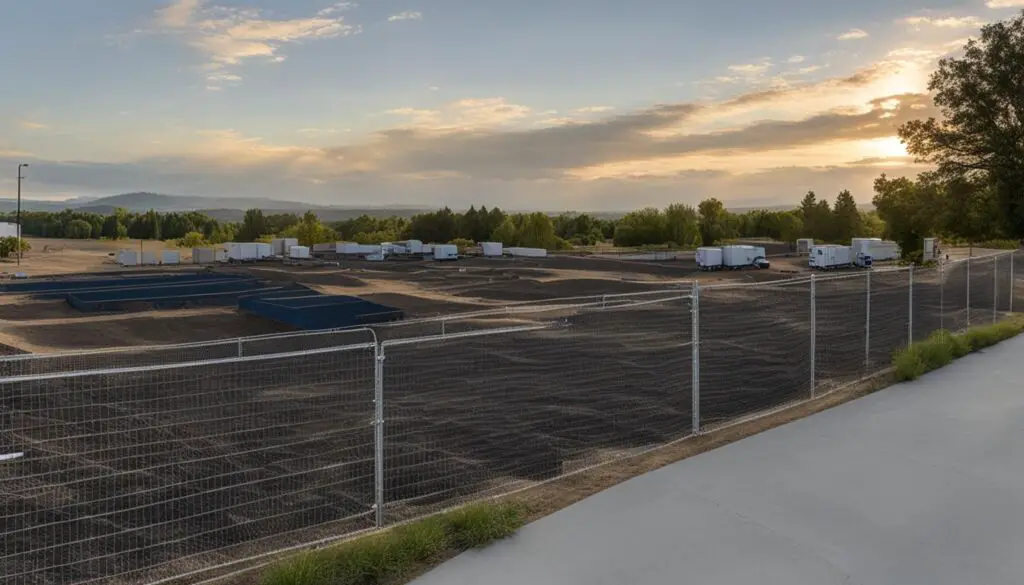If you’re looking for a profitable business opportunity, starting an RV storage company could be just what you need. The increasing demand for storage space among RV owners presents an excellent opportunity to generate steady income. If it’s your first time as an entrepreneur, you may be wondering how to start RV storage business.
To start an RV storage business, first, research local zoning laws and obtain the necessary permits. Choose a suitable location with ample space for RVs and easy accessibility. Invest in security measures like fencing, lighting, and surveillance. Develop pricing plans based on size and duration of storage. Advertise through online platforms, signage, and local media. Provide exceptional customer service to build trust and attract repeat business. Regularly maintain the facility and keep records organized for smooth operations.
This guide will provide you with expert tips and insights on how to start an RV storage business successfully. We will explore each essential step required to be successful in the RV storage business and what you need to do to have a competitive advantage. With a solid plan, a good understanding of your business’s niche, and a willingness to hustle, you can start an RV storage business of your dreams.
Key Takeaways
- Starting an RV storage business can be an excellent opportunity to generate steady income by catering to the increasing demand for storage space among RV owners.
- It is essential to understand the RV storage business landscape, including creating a comprehensive business plan and exploring innovative business ideas to set your facility apart from the competition.
- Choosing the right location, evaluating costs associated with starting a facility and setting up the right infrastructure to cater to the needs of RV owners are crucial keys to success.
- Securing permits, understanding legal considerations and navigating through the regulatory landscape is crucial to ensure smooth operations.
- Marketing strategies are necessary to drive bookings and increase awareness of your business and consequently attract more customers.
Understanding the RV Storage Business Landscape
Starting a RV storage facility requires more than just securing a piece of land and building storage units. Success in this industry requires a deep understanding of the RV storage business landscape, identifying the market niche, and developing strategies to stay ahead of the competition. Creating a comprehensive business plan is the foundation for any successful RV storage facility. It should include a detailed analysis of the market, customer needs, and an operational and financial plan to drive the business forward.
RV storage business ideas can set your facility apart from the competition. One option is to offer additional services such as on-site maintenance, RV washing, or even storage for boats and other recreational vehicles. Another innovative idea is to specialize in storing high-end RVs, providing extra security measures, climate control, and premium services to cater to the luxury RV market.

Developing a RV Storage Business Plan
Your RV storage business plan should include a comprehensive analysis of the industry, target market, and competition. Determine the demand for RV storage in the area and evaluate the feasibility of establishing a new business. This plan should highlight financial projections, operating expenses, and revenue streams.
Identifying a Suitable Location
Location is a critical factor in starting an RV storage facility. Ideally, it is easily accessible, visible, and provides ample space for maneuvering large RVs. Consider the costs of securing the land, building permits, infrastructure setup, and utility expenses. Evaluate local zoning regulations to ensure compliance with laws governing RV storage facilities.
Exploring Business Options
RV storage requires a significant investment of time and capital, but there are various business options to consider. They can include owning and managing the RV storage facility, investing in a franchise, or a joint venture with another business. Evaluate the pros and cons of each business option to choose the one that aligns with your interests and resources.
Evaluating Costs
Starting an RV storage business involves significant startup costs, but the rewards can be substantial. It’s crucial to create a detailed plan, including an analysis of costs associated with land acquisition, infrasctructure, employee salaries, and utilities. Determine the break-even point and create a realistic budget to ensure the business remains financially viable.
“A comprehensive business plan and innovative business ideas can set your RV storage facility apart from the competition.”
As in any new business venture, it’s important to research your market, identify the industry trends, and ensure compliance with zoning regulations and legal considerations. By following the steps outlined in this section, you can build a solid foundation for starting your own successful RV storage business.
Choosing the Right Location and Facility Setup
Location is a significant factor in starting a successful RV storage business. The right location and facility setup can increase your customer base and revenue. Before choosing your spot, consider researching the market demographic to find out if there is sufficient demand in the area. Ensure that you select a location that is convenient and accessible for RV owners and has enough space to build facilities that cater to their needs.
Evaluate the costs of starting an RV storage facility, including land prices, construction costs, and necessary permits. Make a detailed budget that includes all costs, from building to advertising, to avoid financial surprises. Investing upfront might seem costly, but it will be fruitful in the long run.
The costs of starting an RV storage business will vary depending on the location and facility setup, but it is essential to research and calculate them properly to avoid any unexpected financial complications.
Finally, ensure that you set up the right infrastructure to cater to the needs of RV owners. Provide quality customer service and use modern technologies to ensure ease of access and secure storage. Remember, happy customers mean repeat business and positive reviews, leading to increased revenue.
Securing Permits and Legal Considerations
To ensure a successful and legal operation of your RV storage business, it is essential to comply with relevant regulations and obtain the necessary permits. Failure to do so may result in fines, penalties, or even closure of your facility.
Understanding Regulations for RV Storage Business
Before launching your facility, it is crucial to have a comprehensive understanding of the regulations that apply to RV storage businesses in your location. Regulations may vary depending on the state, county, or city, so make sure to research and comply with the relevant authorities. Some of the common regulations for RV storage business may include:
- Building, zoning, and fire codes
- Environmental regulations
- Security and safety requirements
- Insurance requirements
Obtaining Necessary Permits
Once you have a clear understanding of the regulations, you need to obtain the necessary permits to operate your RV storage facility legally. Depending on your location and the scope of your business, the permits may vary. Common permits required for RV storage businesses may include:
- Business license permit
- Building permit
- Zoning permit
- Environmental permit
- Fire and safety permit
Ensure to file your permit applications in advance and complete all requirements before launching your facility. It is important to note that permit processing times may vary depending on the type of permit and location, so plan accordingly.
Understanding Legal Considerations
Apart from regulations and permits, understanding legal considerations is essential to ensure you are fully protected. Some of the legal considerations to keep in mind for your RV storage business may include:
- Liability issues and insurance coverage
- Customer contracts and waivers
- Privacy and security concerns
Protecting your Business with Legal Assistance
If you’re unsure about any aspect of regulations or legal considerations, it’s advisable to seek legal assistance. A lawyer specializing in RV storage business can guide you through the process and ensure that you comply with all the relevant laws.

Effective Marketing Strategies for Your RV Storage Business
Now that your RV storage facility is operational, implementing effective marketing strategies is crucial to reach your target audience and boost bookings.
One impactful way to promote your business is by leveraging digital marketing tools. By creating a well-designed website and optimizing it for search engines using relevant keywords such as “rv storage business,” you’ll increase visibility and attract potential customers.
Additionally, using targeted advertising through platforms such as Google Ads and Facebook Ads can help you reach a broader audience interested in RV storage services.
Another effective marketing strategy is building relationships with RV enthusiasts to increase awareness of your business. By attending trade shows and events, you can connect with potential customers and showcase the unique features of your facility. Consider offering discounts or referral incentives to encourage positive word-of-mouth advertising.
A compelling way to showcase your business is by featuring customer reviews and testimonials on your website and social media platforms. This provides potential customers with an authentic perspective and builds trust in your business.
Customer Reviews and Testimonials
“Renting space from ABC RV Storage was the best decision I made. The staff is friendly, professional and made the move-in process seamless. The facility is conveniently located, and I have peace of mind knowing my RV is secure and well-cared for. I highly recommend ABC RV Storage!” – Sarah K.
By implementing these marketing strategies and focusing on customer satisfaction, you’ll be well on your way to running a successful RV storage business.
Conclusion
Starting and running an RV storage business can be an exciting opportunity that generates a steady flow of income. With the right strategies, planning, and implementation, you can succeed in this highly competitive industry.
Remember, always prioritize location and facility setup, secure all necessary permits, and ensure legal compliance. Embrace marketing tactics like digital marketing, targeted advertising, and engaging with RV enthusiasts to increase awareness and drive bookings.
By following the comprehensive guide provided in this article, you’ll be well-equipped to start your own RV storage business and meet the needs of RV owners. Good luck on your journey!
FAQ
What are some ideas for starting an RV storage facility?
When starting an RV storage facility, you can consider implementing unique features such as covered storage, RV washing stations, maintenance services, and 24/7 security. Providing exceptional customer service and creating a welcoming atmosphere can also set your facility apart from competitors.
How much does it cost to start an RV storage business?
The cost of starting an RV storage business will vary depending on factors such as location, land acquisition or lease, facility construction or renovation, permits, insurance, security systems, marketing, and ongoing operational expenses. It is essential to create a comprehensive budget and financial plan to ensure you have adequate funding to start and sustain your business.
What are the regulations for starting an RV storage business?
Regulations for starting an RV storage business may vary by location and jurisdiction. It is crucial to research and comply with local zoning laws, building codes, environmental regulations, fire safety requirements, and any other relevant permits or licenses. Consulting with legal professionals can help ensure you meet all necessary regulatory obligations.
How can I market my RV storage business effectively?
To market your RV storage business effectively, you can utilize digital marketing strategies such as creating a professional website, optimizing online listings, utilizing social media platforms, and running targeted online ads. Additionally, building relationships with local RV clubs and enthusiasts, offering referral incentives, and participating in industry events can help raise awareness and attract customers.

